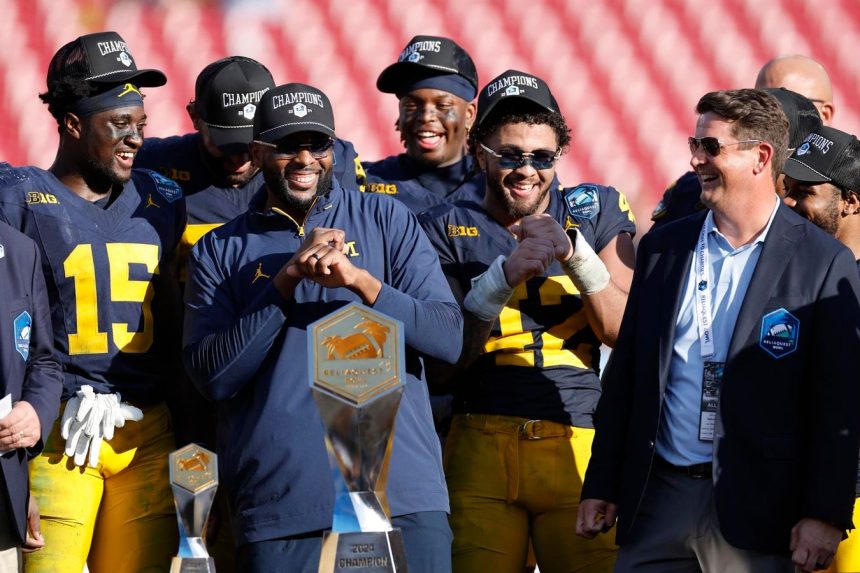Sherrone Moore’s inaugural season as Michigan’s head football coach was a rollercoaster, marked by valuable lessons learned amidst a series of early setbacks. The Wolverines teetered at a .500 record after ten games, drawing the ire of a restless fanbase eager for wins, not philosophical pronouncements about growth. Moore, however, steadfastly maintained his focus on the bigger picture, emphasizing the importance of extracting wisdom from each defeat, a perspective ultimately vindicated by the team’s dramatic late-season resurgence. The 5-5 start, punctuated by a frustrating loss to Indiana, served as a crucial turning point. The subsequent bye week provided an opportunity for intense self-reflection and a renewed commitment to fundamental execution.
This period of introspection and refinement proved transformative. Michigan emerged from the bye week with a vengeance, dismantling Northwestern in a dominant 50-6 victory. The Wolverines then orchestrated a stunning upset of second-ranked Ohio State, a triumph that reverberated throughout the college football world. This unexpected victory, far from being a fluke, signaled a fundamental shift in Michigan’s trajectory. The momentum continued into the postseason, culminating in a hard-fought 19-13 victory over eleventh-ranked Alabama in the ReliaQuest Bowl. This win over the Crimson Tide, a team Michigan had previously vanquished en route to a national championship, underscored the Wolverines’ resilience and reaffirmed their status as a top-tier program.
The team’s late-season success was largely driven by a stingy defense that consistently stifled high-powered offenses. Holding Indiana, Ohio State, and Alabama to a combined 43 points—a stark contrast to their typical offensive output—was a testament to the unit’s exceptional performance. The defense’s dominance was further exemplified in the blowout win against Northwestern, where they limited the Wildcats to a mere field goal. Over the final four games, Michigan’s defense allowed a paltry 46 points, showcasing their remarkable turnaround. This defensive prowess was spearheaded by coordinator Wink Martindale, whose strategic acumen and ability to maximize his players’ talents were instrumental in the team’s resurgence.
Despite the defensive heroics, Michigan’s offensive struggles, particularly in the passing game, were a persistent concern throughout the season. The quarterback rotation of Davis Warren, Alex Orji, and Jack Tuttle yielded dismal results, culminating in a pass efficiency rating that ranked near the bottom of all FBS teams. Their collective inability to generate explosive plays through the air was a significant impediment to the offense’s effectiveness. The Wolverines’ anemic passing attack averaged a meager 8.8 yards per completion, the worst mark in the nation. This glaring deficiency underscored the need for a drastic overhaul of the passing game, prompting the hiring of Chip Lindsey as the new offensive coordinator. Lindsey, with his proven track record of offensive success at North Carolina and Troy, was tasked with revitalizing Michigan’s aerial attack.
Looking ahead to the 2025 season, addressing the quarterback situation was paramount. While the ground game showed promise with the emergence of freshman Jordan Marshall, whose breakout performance in the ReliaQuest Bowl hinted at a bright future, the passing game remained a major question mark. Moore acknowledged the need for significant improvement in this area, emphasizing the importance of developing a more explosive and dynamic passing attack. The arrival of transfer quarterback Mikey Keene, who had previously thrived under Lindsey’s tutelage at UCF, offered a glimmer of hope. Keene’s experience and proven ability to throw the ball effectively provided a potential bridge to the future while highly touted recruit Bryce Underwood continued his development. Adding Jaydn Davis, a top-rated quarterback prospect, further bolstered the quarterback room and provided additional options for the upcoming season.
The Wolverines’ late-season surge, capped by the bowl victory over Alabama, instilled a sense of optimism for the future. Despite the offensive inconsistencies, the team’s resilience and defensive dominance provided a solid foundation for continued growth. Moore expressed confidence in the program’s trajectory, citing the strong recruiting efforts and the retention of key players as crucial factors in building a championship-caliber team. With a renewed focus on offensive improvement and a promising influx of talent, Michigan appeared poised to contend for greater success in the coming season. The lessons learned from the early-season struggles, coupled with the late-season triumphs, provided valuable experience and a renewed sense of purpose as the Wolverines looked to reclaim their place among college football’s elite.



